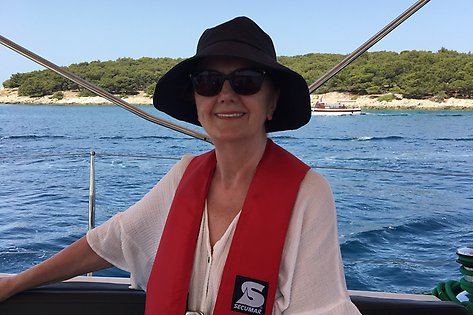The Diet-Environment-Health Nexus - Interview with Alicja Wolk
In this interview, Uppsala Health Summit meets Alicja Wolk who is a professor of Nutritional Epidemiology at Karolinska Institutet. First, Alicja tells us about her extensive research background focused on diet and other modifiable lifestyle factors related to chronic diseases, including cancer, cardiovascular diseases, diabetes, osteoporosis, age-related cataracts, and healthy ageing.
These kinds of studies are of great importance for public health promotion as well as primary and secondary disease prevention. For more than 30 years, I have been systematically developing this research field, resulting in over 800 publications. My studies are based on two population-based prospective longitudinal cohorts, including over 100,000 participants. The cohorts, with extensive, repeated over time, information about diet and lifestyle and available genetic information, are annually followed up by linkage to national health registers to update information about the health status of the participants", says Professor Alicja Wolk, Karolinska Institutet.

Alicja Wolk, Professor, Karolinska Institutet, Stockholm
Alicja Wolk leads the workshop Diet-Environment-Health Nexus at the upcoming summit. Her workshop colleagues are Eva Warensjö Lemming, Nicklas Neuman, Emma Patterson, Stephanie Pitt and Carolin Zorell, who all have a broad research experience in topics related to food systems from Örebro University, Karolinska Institutet, and Uppsala University. We asked Alicja about the process of collaboration she and her workshop colleagues went through to arrive at this year’s workshop topic.
More recently, I have extended my research to include not only the impact of diet on human health but also on the environment and planetary health. Now, I am combining these two lines of research in one of my ongoing projects. This 5-year project, financed by Formas, has the same title “Diet-Environment-Health Nexus” as the Workshop I am preparing for the Uppsala Health Summit 2022 and will define a diet that is not only optimal for health but also has a low impact on the environment. This project is not addressing the question of HOW we can implement such an optimal diet in a whole population; this will be the main question asked during the Workshop. Because research on implementing changes in behaviour is not my expertise, I asked my colleagues from other universities to help with these challenging issues", says Professor Alicja Wolk.
In your opinion, what are the leading public health concerns in relation to food systems, and what needs to be done to achieve sustainable and equitable food systems promoting our health?
In my opinion, the most urgent concerns and challenges related to dietary patterns in Sweden and, in general, in developed countries are too low consumption of plant-based food (whole grains, vegetables, fruit, legumes), too high consumption of some animal-based food (processed meat, red meat, dairy) and too high and increasing consumption of processed food. Our estimates based on the self-reported diet of middle-aged and elderly Swedish men and women show that only 3-5 per cent of this adult population fulfil all criteria for a healthy diet. This very low per cent is annoying, but we should look at this with an optimistic eye and see enormous opportunity for improvement of diet in 95 per cent of the population. In consequence, not only the health of the population would improve, but also, in parallel, the impact of consumed foods on the environment would decrease. It would be a win-win situation for both people and the planet", says Professor Wolk.
What are your expectations for Uppsala Health Summit 2022 and your involvement?
I expect that the Workshop “Diet-Environment-Health Nexus” organised by our group within the frame of Uppsala Health Summit 2022 will deepen our understanding of a very complex interplay of many interdisciplinary factors determining our food habits. I hope that participants invited to this Workshop - representing academia, authorities, the private sector, non-profit organisations, communicators, etc.- will come up with novel and realistic solutions to some of the diet-environment-health challenges. I hope that these ideas will lead us to at least a little step toward better health and environment via a better diet and will be implemented", says Alicja Wolk.
Can you tell us about an ‘Aha moment’ you have had in your research?
It was fascinating to see our first results from the Formas project based on dietary information from 100,000 women and men from central Sweden (data from SIMPLER – Swedish Infrastructure for Medical Population-based Life-course and Environmental Research), how the environmental impact of diet was decreasing with increasing “healthiness” of the diet. In other words - the better the diet, the lower the impact on the environment and the better health of people and the planet", says Wolk.
